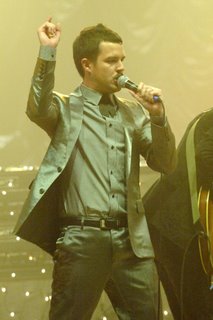
The Killers Invite Us to “Sam’s Town”
A supremely self-conscious rock band from
If anyone had the vox and visage to get away with such hyper hype, it was this awkward and ambitious paradox of a pop icon, the manic Mormon Morrissey and messianic Metrosexual Meatloaf. But it appears he’s not getting away with it very well at all.
For reasons known and unknown, the critics crashed the party before it began; and as the record hits the racks, the backlash against Brandon Flowers rages full on. The disc’s many detractors would have apparently preferred “Hot Fuss, Part Two.” But as it pays tribute to region with calculated religiosity, “Sam’s Town” aims big and owes a spiritual debt to Bono and Bruce. But in coming home to Vegas to celebrate
If we temporarily forget the odd facial hair and Anton Corbijn photos, the disc itself has musical and poetic depth, anchored in an intentionally mystical, yet earthy, flavor. Sure, the record has an intricate and over-produced sense of its own power, but not a throwaway track among the 12, and several simmer with stunning similes and sonic soul. With so many soothing hooks, addictive anthems, and hypnotic hymns, the band deserves better than to have its sophomore sojourn savaged because of the young singer’s loose and boastful tongue. The conceptual title track and searing sing-along single aside, tracks like “Read My Mind,” “Uncle Jonny,” “Bones,” and “The River is Wild” are all as good—or better—than anything on the first record.
Waking up for track four “on the roadside in the land of the free ride,” Flowers feels the wind on his face as he faces the devil of his own doing. Why is an ambiguous anthem about spiritual survival that drenches us in “desert rain” called “Bling (Confessions of a King)”? As the coda takes us “higher and higher,” we’re left to ponder another kind of bling, perhaps made of fool’s gold or a heavenly treasure that cannot be worn on fingers or in ears. If this is an honest reassessment of the trappings of success, Flowers isn’t crisp enough in navigating the lyrical landscape to get away with it. Understandably bewildered, many listeners will see this sophisticated confession as a conceptual train wreck.
Now, as for the whole band posing as rugged, scruffy, trailer-park tramps: image manipulation, as anyone who has been paying attention to the genre for the last 40 years knows, is part of the profession. Rock’s nothing more than a giant, dress-up closet for grown, gregarious men unafraid to nurture the boy (and often girl!) within. The photogenic Flowers has a flair for fashion—as his large following of less cynical fans would gladly testify. The rest of the group—David Keuning (guitar), Mark Stoermer (bass), and Ronnie Vannucci, Jr. (drums)—look really good, too.
But for the corp of American rock media intelligentsia, certain cows are sacrosanct, and their hides should not be donned—even as part of a drag show. The previously fey Flowers has been fluffing on a steady diet of all-American musical beef—and a particularly choice
And since the born to run for another massive metaphor nature of it all is more black jeans and bolo tie than E-Street bite, the whole press circus seems rather silly. The Killers remain dancy, synthy, a new generation’s new wave group. However, some uptight people (many of them rock critics and the kind of nerds who post excessively on rock blogs) think the too-good-looking-for-his-own-good Las Vegan meant some kind of disrespect by acting Boss. Such naysayers may be jealous or just forgetting that imitation is flattery. But all of us entering this fray (this reviewer included) are discussing the side-story, forgoing the sheer fabulousness of the record.
The Killers’ brand of American pride is more about channeling camp and kitsch than about killing anything. So why does the man who gave us the line “I’ve got soul, but I’m not a soldier” deserve a media trampling from the cynically correct reminiscent of the one the Dixie Chicks got from the warmongers?
While the entirety of “Sam’s Town” engraves its musical mood more with each listen, it’s not an easy record to come home to precisely because it’s a record about home and roots dedicated to a place that has a surreal and rootless soul so tangled up in cash, tits, and bright lights. The record rocks carefully and carelessly, rolls soulfully and shamelessly, selling a biblical sense of itself: confronting demons like addiction; invoking clouds, hills, wild rivers, and thunder beings; and kissing the dirty ground.
With “Sam’s Town,” The Killers’ extreme makeover involves more musical nuance than merely altering an outward aesthetic. But taking Vegas as an anchor to revision roots music in a time of national confusion is, in fact, an extremely risky move for a band most associated with synthesizers and eyeliner. But “Sam’s Town” is an extreme record—extremely good.
No comments:
Post a Comment